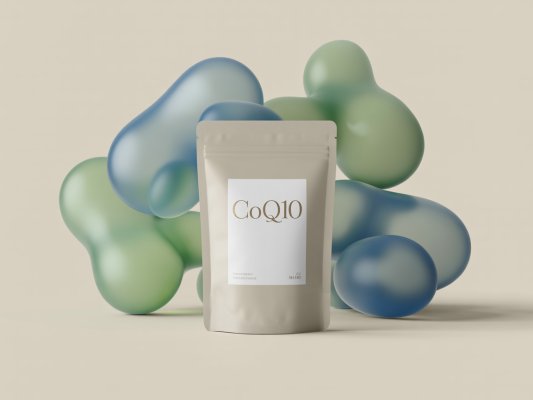
CoQ10
Description
Coenzyme Q10, often shortened to CoQ10, is a naturally occurring compound in the body that plays a vital role in cellular energy production. It also functions as a potent antioxidant, protecting cells from damage. This article provides a comprehensive yet accessible overview of CoQ10, covering its benefits, dosage, potential side effects, and more, empowering you to make informed decisions about its use.
Quick Overview: CoQ10 At-a-Glance
- Key Benefit: Supports cellular energy production and acts as an antioxidant.
- Primary Mechanism: Facilitates ATP production in mitochondria and neutralizes free radicals.
- Best For: Supporting heart health, potentially mitigating statin side effects, and overall cellular function.
- Typical Dose Range: 100-200mg daily, but can vary based on individual needs.
- Key Caution/Consideration: May interact with blood thinners; consult a healthcare professional before use.
Table of Contents
Categories & Effectiveness
Learn about our rating methodologyBrain Health
Brain Antioxidant Shield
4/10Moderate evidence of effectiveness
Energy & Alertness
Cellular Energy (ATP)
7/10Strong evidence of effectiveness
Systemic Health
Anti-Inflammatory (Systemic)
7/10Strong evidence of effectiveness
Systemic Antioxidant
7/10Strong evidence of effectiveness
Cellular Anti-Aging
4/10Moderate evidence of effectiveness
Immune System Boost
4/10Moderate evidence of effectiveness
Dosage & Side Effects
Recommended Dosage
- Typical adult dose: 100-200mg daily, but dosages up to 1200mg have been used in clinical trials.
- For heart health: Many find benefits in the 100-200mg range.
- For statin-related muscle symptoms: 50mg twice daily has shown some benefit.
Potential Side Effects
- Watch For: Digestive upset, skin rash, or sleep disturbances.
Bioavailability & Half-Life
Interactions & Stacks
Recommended Products
Source Naturals NADH 10mg, Boost Energy and Mental Alertness*, 10mg - 30 Peppermint Lozenges
- Rated 4.1 stars by 65 customers
- Premium quality ingredients
Bandini® Coenzym Q10 | 120 hochdosierte Kapseln mit 200 mg pro Kapsel | Hochwertiges (veganes) Ubichinol aus Fermentation | Keine unerwünschten Zusatzstoffe, keine GMOs | 1 Kapsel/Tag für 4 Monate
- Rated 5.0 stars by 2 customers
- Premium quality ingredients
Pure Encapsulations - CoQ10 60mg - 30 Kapseln
- Rated 4.9 stars by 24 customers
- Premium quality ingredients
As an Amazon Associate we earn from qualifying purchases. Prices and availability are accurate as of the date/time indicated and are subject to change.
Benefits by Use Case
Heart Health Support
CoQ10 supports heart muscle function by facilitating energy production within heart cells. It may also help improve symptoms of heart failure and reduce blood pressure. However, it is not a replacement for conventional heart medications.
Migraine Prevention
Some studies suggest that CoQ10 supplementation can reduce the frequency of migraine headaches. However, it may take several months to see noticeable results, and it is not effective for acute migraine attacks.
Statin Side Effect Mitigation
Statins, cholesterol-lowering drugs, can sometimes deplete CoQ10 levels in the body, leading to muscle pain and other side effects. CoQ10 supplementation may help alleviate these symptoms, but consult your doctor before starting supplementation.
Fertility Enhancement
CoQ10 may improve egg quality in women and sperm activity and concentration in men, potentially enhancing fertility. More research is needed to confirm these benefits, and it should not be considered a primary fertility treatment.
Neurodegenerative Disease Support
CoQ10's antioxidant properties may help protect brain cells from damage, potentially slowing the progression of neurodegenerative diseases like Alzheimer's and Parkinson's. However, current evidence is preliminary and more research is required.
General Antioxidant Support
As a powerful antioxidant, CoQ10 helps neutralize harmful free radicals, protecting cells from oxidative stress and damage. This can contribute to overall health and well-being.
Mechanism of Action
Frequently Asked Questions
Where to Buy CoQ10
Based on quality, price, and customer reviews, here are our top recommended CoQ10 supplements:
Source Naturals NADH 10mg, Boost Energy and Mental Alertness*, 10mg - 30 Peppermint Lozenges
- Rated 4.1 stars by 65 customers
- Premium quality ingredients
Coenzym Q10 - Hochdosiert mit 250 mg pro Kapsel. 120 vegane Kapseln im 4 Monatsvorrat - Angereichert mit Biotin & Niacin als Beitrag zum Erhalt normaler Haut & für einen normalen Energiestoffwechsel.
- Rated 4.6 stars by 1,473 customers
- Premium quality ingredients
Ubiquinol CoQ10 600 mg Softgelkapseln - Aktive Form von CoQ10 Plus Vitamin E & Omega 3 6 9 - Fortschrittliches Coenzym Q10 60 stück (1er Pack)
- Rated 4.4 stars by 504 customers
- Premium quality ingredients
As an Amazon Associate we earn from qualifying purchases. Prices and availability are accurate as of the date/time indicated and are subject to change.
Summary & Expert Opinion
- Key Strengths: Well-tolerated for most, supports mitochondrial function, and may alleviate muscle pain associated with statin use.
- Key Weaknesses: Limited evidence for many proposed benefits, potential interactions with blood thinners, and varying bioavailability.
- Recommendation: Consult with your doctor before taking CoQ10, especially if you have existing health conditions or are taking medications.
Deeper Technical Analysis:
CoQ10's mechanism of action involves its role as a mobile electron carrier in the mitochondrial respiratory chain, specifically complexes I, II, and III. By accepting and donating electrons, it facilitates the flow of protons across the inner mitochondrial membrane, creating an electrochemical gradient that drives ATP synthesis. In simple terms, CoQ10 is a crucial component in the cellular power plant, ensuring efficient energy production. The reduced form, ubiquinol, is also a potent antioxidant, scavenging free radicals and preventing lipid peroxidation.
The pharmacokinetics of CoQ10 are complex. Its lipophilic nature contributes to poor aqueous solubility, limiting oral bioavailability. Absorption is significantly enhanced when taken with fat-containing meals due to incorporation into chylomicrons. Factors like age, genetics (specifically variations in genes encoding enzymes involved in CoQ10 synthesis), and certain medications (statins, beta-blockers, some oral hypoglycemics) can influence CoQ10 levels. While generally safe, high doses (above 300mg/day) have been associated with elevated liver enzymes in some individuals, though liver toxicity is rarely reported. Studies on the interaction between CoQ10 and warfarin have yielded conflicting results, highlighting the need for careful monitoring of INR (International Normalized Ratio) in patients taking both. The potential for CoQ10 to lower blood glucose levels warrants caution in individuals with diabetes, as it may necessitate adjustments in medication dosages. The Cancer.gov source notes an observational study suggesting a possible link between antioxidant use (including CoQ10) during chemotherapy and increased recurrence/decreased survival, but this requires further investigation and should be interpreted cautiously due to the limitations of observational studies.









